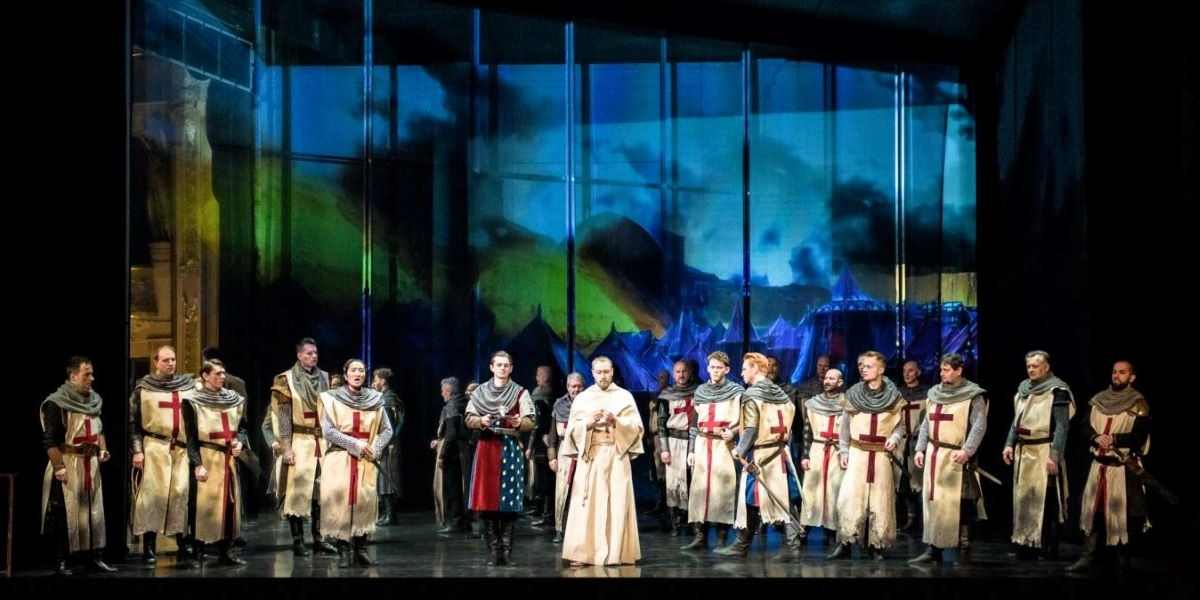People may not have heard of Dvořak’s rarely performed Armida. Dvořak was at the height of his powers when composing Armida.
Dvořak was fascinated by this tale of magic and sorcery despite operas on Armida had already been composed 10 times before by composers such as Gluck, Lully, Handel, and Rossini. Departing from popular Czech folklore enabled him to compose oriental and other themes, hitherto unheard in his music. Dvořak’s music is grand, dramatic, romantic, passionate, melodious, haunting, magical, and powerful, even including a dreaded stage curse! All that can be heard in the overture – orientalism, magic, drama, religion, and passion.
Armida is Dvořak’s tenth and final opera, first performed only weeks before his death. It returns to Plžen’s stunning theatre after 80 years as a Wexford co-production. It premiered in January 2023 and the phenomenal success of this terrific production places Armida firmly back in the repertoire.
Just this week there were two very different performances of Armida within an hour of each other – in Plžen, and a new production in Prague.
The plot: In Damascus, Ismen, a prince and magician, wants to marry the sorceress, Armida. She resists, having seen Rinald hunting a doe in the forest and fallen for him. Ismen foresees the destruction of Damascus by the Crusaders. He persuades King Hydraot, Armida’s father, that Armida, should mislead the Crusaders, with her sorcery. Armida enters the camp, tells a pack of lies about her family’s persecution, Bohimir the leader offers help, but there she meets Rinald, they fall in love and run away. Meanwhile Ismen, takes them on a dragon chariot to his magic castle. Ismen, as revenge for being rejected again, gives the Crusaders Archangel Michael’s diamond shield which entices Rinald to abandon Armida and rejoin the Crusaders. The palace collapses as Armida’s grieves. Rinald returns as a Crusader, kills Ismen, is challenged by a stranger, who he kills, to discover it is Armida who dies in his arms.
The set is a white, Moorish room with a mirror/transparent screen diagonally across, enabling stunning video magic effects and visions (dragons, construction and deconstruction of Armida’s castle, the burning of Damascus, and the Crusaders’ encampment), and double action in front of and behind the screen. The costumes are traditional Islamic, or chain mail with the Crusaders’ large red cross.
The score makes huge demands on the three demanding main roles and the orchestra and are the cornerstones of this successful production.
Ukrainian hero, bass-baritone Andrii Kharlamov, as Ismen, multi- competition winner, has a glorious voice. The reader may remember Ukranian singers, singing their national anthem in protest last year outside the Odessa Opera House. Kharlamov was one of them, joining the resistance for rifle training and filling sandbags. He dominates scene 2, with his rich voice in ‘lsti zvitěziŝ’ (you will shine), and ‘ty sladké výmluvnosti duchu’ (those sweet delusions) Ismen dominates Act 3 with vocally demanding music; Kharlov should pace himself better, I heard some vocal tiredness.
Czech soprano Ivana Veberová is a Plzeň star, and Thalia award winner. Her first aria ‘za ŝtihlou gazelou’ (reminiscent of Rusalka’s Song of the Moon) shows a stunning, radiant voice, easily coping with the difficulty, apart from the odd top note. She spun high top notes beautifully in ‘Ó, srdce, ztiŝ svůj tlukot směly’(quiet my beating heart) with lovely phrasing. She wears white at the beginning showing innocence, veiled black in the Crusaders’ camp, and red as the beautiful seductress in the enchanted castle and is superb in this difficult part.
Czech lyric tenor Jakub Pustina won a Nobel Prize in analytical chemistry before discovering opera at 21, won competitions and awards, singing for 10 years as a baritone. His exciting, heroic voice is well suited to the conflicted Rinald. His long, demanding final act scene – sàm, v pouŝti sám o hrůzo’ (alone in the wilderness) where his idealism and infatuation has become sick confusion, mourning verging on madness is a riveting highlight of the evening.
Czech baritone Jiřĩ Brückler, as Bohumir is another multiple prizewinner andCzech bass, Jan Hnyk as Petr have terrific voices.
Ukranian bass, Jevhen Ŝokalo as King Hydraot, another Plzeň regular, has a good bottom and middle register; sadly, the top register is not there anymore.
I loved everything about this and highly recommend opera-travellers to visit Plzeň for this opera and the beer!

